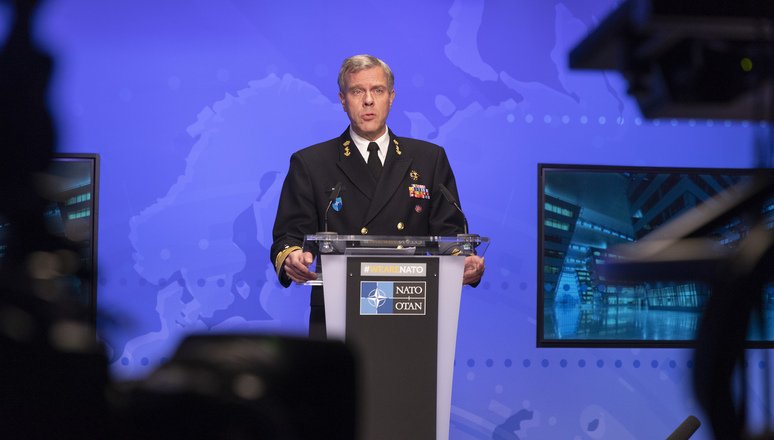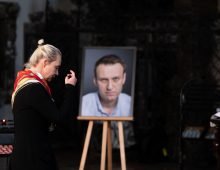NATO does not require the creation of a division in Lithuania, Rob Bauer, chair of the NATO Military Committee says, adding that allied support for such a military unit will depend on bilateral discussions, told NATO admiral in BNS interview.
Lithuania plans to establish the unit by 2030, given the country’s current defense funding. However, it would not be fully manned another five years, which means that Lithuania would have to ask for allied support during this period and will need long-range artillery, rocket artillery, reconnaissance or aviation units.
“That is a discussion that other nations can have with Lithuania. There is not a hard requirement from NATO for a division in Lithuania, but it is good to have a division in Lithuania, of course,” the admiral said in an interview with BNS last week. “So everyone will look at this, and if nations can and are able to help Lithuania with that, they can decide so and at the same time, Lithuania has to build those capabilities over the coming years. And so the fact that it is not there now shouldn’t be treated as a negative thing. It is a normal thing that if you build such a large unit, like a division, it will take time.”
The Lithuanian foreign minister has recently said that Russia is mobilizing resources for a war with NATO. Nonetheless, German experts predict that after the end of the intense fighting in Ukraine, it will take the Moscow regime 6 to10 years to rebuild its armed forces. Is the Alliance ready for war?
The alliance is always ready. And that is our duty because we are a defensive alliance. (…) NATO started to work on a new military strategy in 2018. What was produced saw the light of day in 2019. It was a threat-based military strategy and the threat is both Russia and terror groups. So that was a big change in the thinking because for a long, long time, almost 20 years, NATO saw Russia as a partner. But once Russia’s aggressive behavior started, we started developing new military strategies. One is for the defense of the Euro-Atlantic area, and the other is to make sure we are also ready for future threats.
All this work on collective defense meant that when the Russians invaded Ukraine on the 24th of February 2022, NATO was ready and we immediately had 120 aircraft airborne within hours and we had more and more ships at sea and 40,000 troops under the command of NATO within less than two weeks. So that was how NATO was able to respond, and that was not even a situation where we were attacked, the Alliance itself.
If you want peace, you need to prepare for war and strengthen your deterrence. That is the best way to prevent war from ever happening. We are not at war with Russia and I think the Russians don’t want a war with NATO because I’m convinced they know that they will lose that.
But even German Defense Minister Boris Pistorius has admitted that the European Union will not be able to produce one million artillery shells for Ukraine. Do you see any risks that the European military industry is adapting too slowly to the changed geopolitical environment?
For me, supporting Ukraine and strengthening our own defenses are two different things. I fully agree with the German minister that we need to ramp up production to support Ukraine. Because we see that the Russian economy is changing to a wartime economy. And that means that the Russian economy is serving the war efforts as the main effort, and that is not the case in Europe. It is a little bit more the case in the US where they have more instruments to basically order the industry to give preference to defense in terms of production. So yes, the European industry needs to ramp up faster. But in most liberal economies that takes longer because we deal with private investors, with all sorts of regulations, and therefore I am talking about this subject a lot because we need this, we need this faster and we need it in larger numbers.
Doesn’t that imply that Europe is too dependent on the US and its military capabilities in that case?
NATO’s defense and deterrence is a combined effort of all the allies. The United States Armed Forces are the biggest and therefore they play a very important role. However, it is important that the Canadian and European Armed Forces start playing a bigger role in providing capabilities. The plans that have been approved in Vilnius during the summit in July are actually aiming at a larger contribution from the European and Canadian Armed Forces in order to rebalance that a little bit.
Speaking specifically of Lithuania. The agreement between Vilnius and Berlin makes Lithuania the only country in the eastern flank with a brigade size unit from a NATO ally. Lithuania, obviously, is pleased with this decision, but how doesn’t that reduce your ability as a planner to deploy forces where they are most needed?
Not necessarily. The good thing about the German brigade in Lithuania is that with these regional plans, there is a better connection between the national defense plans and their regional NATO plants. So, as a result of that, the nations are focusing more on their own region. It doesn’t mean they cannot be everywhere, but the nations in the region will first and foremost look at deploying their forces to neighboring countries or countries that are close by, and therefore this decision from the German and the Lithuanian governments is a logical one because it is building on this long-standing relationship since the start of eFP in 2016.
But how do you feel about Lithuania being the only country in the eastern flank with this kind of brigade?
The decision in Madrid was to have 8 battle groups along the eastern flank with the minimum size of an enabled battalion. That was the decision that is being realized and the decision was always that those battle groups needed to be able to beef up to a brigade if it is necessary, based on intelligence. A number of nations already have seen exercises with a brigade coming to them, so you see that the mechanism works and the battle groups can be beefed up to a brigade if necessary.
The decision by Germany and Lithuania to permanently ramp up to a brigade does not go against NATO plans, it complements our plans. The decision is a clear show of solidarity between allies. It requires a lot of investments on both sides. But it sends a clear message that NATO is ready to defend every inch of allied territory. And that is exactly the goal of our regional plans: to make sure we combine forward defense with strategic flexibility in order to protect every inch in all domains.
Do you see any possibilities for other countries to beef up their battalions to a brigade in the nearest future?
That’s up to nations and it’s up to the lead nations. We see a deal between Latvia and Canada where more people from Canada come to Latvia for a reason that is also understandable because if you are in Canada with a lot of troops and material, it takes more time to get to Latvia. So they beef up their presence and as a result, there will be more troops in Latvia as well, like in Lithuania.
Lithuania plans to create a division in 2030. However, initially, for at least five years, Lithuania will not have the so-called enabler units of its own and is seeking to have them from NATO. Do you see any opportunities for this?
That is a discussion that other nations can have with Lithuania. There is not a hard requirement from NATO for a division in Lithuania, but it is good to have a division in Lithuania, of course. So everyone will look at this. If nations can and are able to help Lithuania with that, they can decide so and at the same time, Lithuania has to build those capabilities over the coming years. And so the fact that it is not there now shouldn’t be treated as a negative thing. It is a normal thing that if you build such a large unit like a division, it will take time.
Lithuania is also looking for partners that could deploy air defense elements in the country on a rotational basis, replacing the air policing mission. Almost half a year has passed since defense ministers agreed on such a model, but no agreement has been signed. When could a breakthrough be expected?
All these things take time. This is about capabilities that nations do not necessarily immediately have, about making sure that nations can deploy to, in this case, Lithuania or any other Baltic nation. We’re going to talk about this at the February meeting of defense ministers.
Source: BNS
(Reproduction of BNS information in mass media and other websites without written consent of BNS is prohibited.)


















